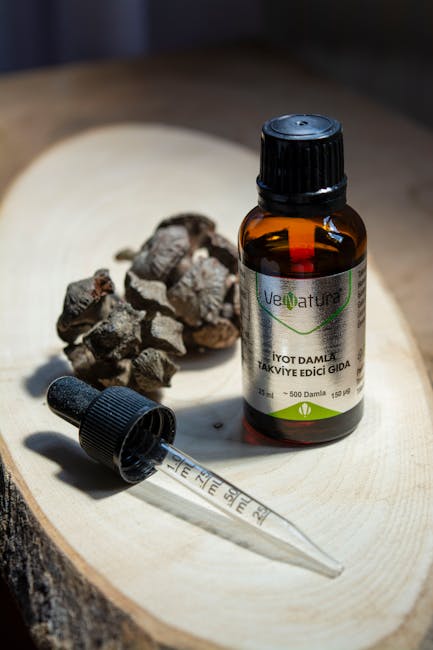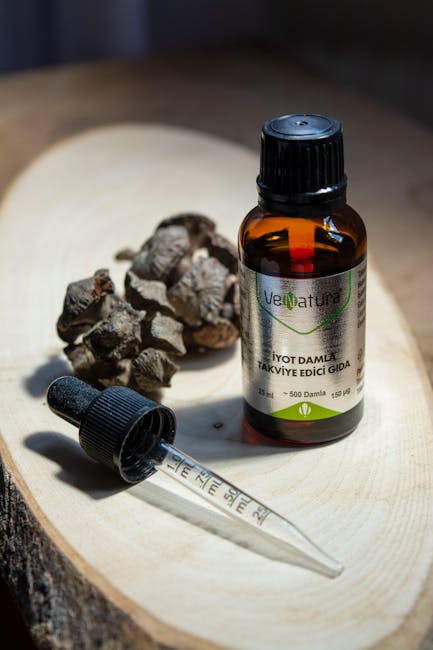Iodine Supplement Guide: Benefits, Risks, Dosage, and Finding the Right One for You
Iodine, a crucial trace mineral, plays a vital role in numerous bodily functions, most notably thyroid hormone production. While readily available in many foods, iodine deficiency remains a global health concern, leading many to explore iodine supplements. This comprehensive guide delves into the benefits, risks, recommended dosages, and various types of iodine supplements, helping you make informed decisions about incorporating iodine into your health regimen.
Understanding Iodine’s Role in the Body
The thyroid gland, located in the neck, utilizes iodine to produce thyroxine (T4) and triiodothyronine (T3), essential hormones regulating metabolism, growth, and development. Inadequate iodine intake can lead to hypothyroidism, characterized by fatigue, weight gain, constipation, and cognitive impairment. Conversely, excessive iodine can also disrupt thyroid function, resulting in hyperthyroidism, with symptoms like anxiety, weight loss, and rapid heartbeat.

Key Functions of Iodine:
- Thyroid Hormone Production: Iodine is the critical building block for thyroid hormones, impacting nearly every cell and organ system.
- Metabolic Regulation: Thyroid hormones control metabolism, influencing energy production, body temperature, and heart rate.
- Growth and Development: Adequate iodine intake is crucial for proper fetal and infant development, particularly brain development.
- Cognitive Function: Iodine plays a role in cognitive function, impacting memory, concentration, and overall mental well-being.
Benefits of Iodine Supplementation
While a balanced diet often provides sufficient iodine, supplementation may be beneficial under specific circumstances. These include:
- Iodine Deficiency: Individuals living in iodine-deficient regions or with dietary restrictions may benefit from iodine supplementation.
- Pregnancy and Breastfeeding: Adequate iodine intake is essential for fetal and infant development. Pregnant and breastfeeding women may require higher iodine levels.
- Hypothyroidism: Under the guidance of a healthcare professional, iodine supplementation may be part of a treatment plan for hypothyroidism.
- Thyroid Disorders: In some cases, iodine supplementation may be used in conjunction with other treatments for certain thyroid disorders. However, it is crucial to consult a doctor before self-medicating.
- Improved Cognitive Function: Some studies suggest that iodine supplementation may improve cognitive function in individuals with iodine deficiency.
Types of Iodine Supplements
Several forms of iodine supplements are available, each with its own absorption rate and potential side effects:
1. Potassium Iodide:
A common and readily absorbed form of iodine, often used in over-the-counter supplements and for radiation emergencies.
2. Lugol’s Solution:
A concentrated solution containing potassium iodide and iodine, offering a higher iodine concentration. Requires careful dosage and supervision by a healthcare professional due to its potency.
3. Iodized Salt:
A readily accessible source of iodine, although the amount of iodine varies depending on the brand. Not a suitable standalone supplement for those requiring higher doses.
4. Kelp:
A type of seaweed containing iodine, it’s a natural source but the iodine content can be variable, making it difficult to control the exact dosage.
Risks and Side Effects of Iodine Supplementation
While generally safe when taken at the recommended dosage, excessive iodine intake can lead to several adverse effects:

- Hyperthyroidism: Excessive iodine can trigger or worsen hyperthyroidism, leading to symptoms like anxiety, weight loss, and rapid heartbeat.
- Thyroiditis: Inflammation of the thyroid gland can occur with excessive iodine intake.
- Allergic Reactions: Some individuals may experience allergic reactions, including skin rashes, itching, and swelling.
- Gastrointestinal Issues: Nausea, vomiting, and diarrhea can occur with high doses of iodine.
- Medication Interactions: Iodine supplements can interact with certain medications, such as lithium and amiodarone. Always consult your doctor before taking iodine supplements if you are on other medications.
Recommended Dosage and Precautions
The recommended daily allowance (RDA) for iodine varies depending on age and health status. It is crucial to consult your doctor or a registered dietitian to determine the appropriate dosage for your individual needs. Self-treating can lead to adverse health outcomes. They can assess your current iodine levels and provide personalized recommendations.

Never exceed the recommended dosage without consulting a healthcare professional. Even seemingly mild symptoms like nausea or skin irritation warrant immediate discontinuation of the supplement and consultation with your doctor.
Finding the Right Iodine Supplement
When choosing an iodine supplement, consider the following factors:
- Form of Iodine: Choose a form that is easily absorbed and suitable for your needs.
- Dosage: Select a dosage appropriate for your individual needs, as determined by your doctor.
- Purity and Quality: Opt for reputable brands that adhere to strict quality control standards.
- Third-Party Testing: Look for supplements that have been tested by independent third-party labs to ensure purity and potency.
- Ingredients: Check for any unnecessary additives or fillers.
Conclusion
Iodine supplementation can be beneficial for individuals with iodine deficiency or specific health conditions. However, it’s crucial to approach iodine supplementation responsibly and under the guidance of a healthcare professional. Understanding the benefits, risks, different forms of iodine supplements, and recommended dosages empowers you to make informed decisions about incorporating iodine into your health plan. Always prioritize consulting your doctor before starting any new supplement regimen.

